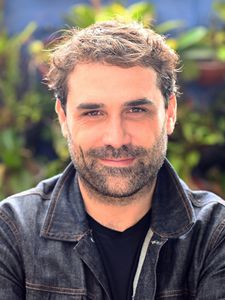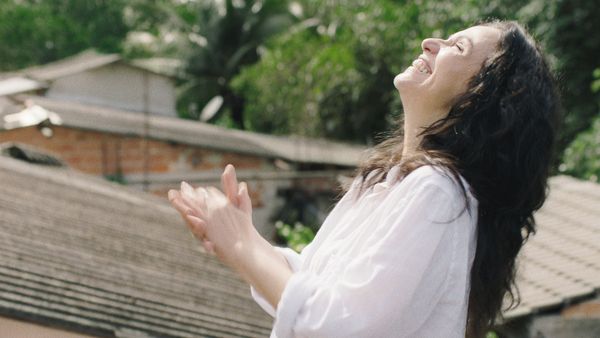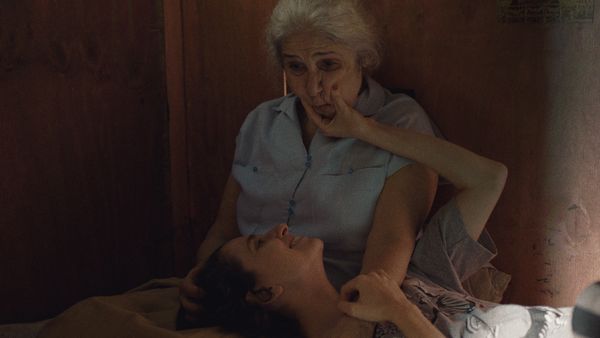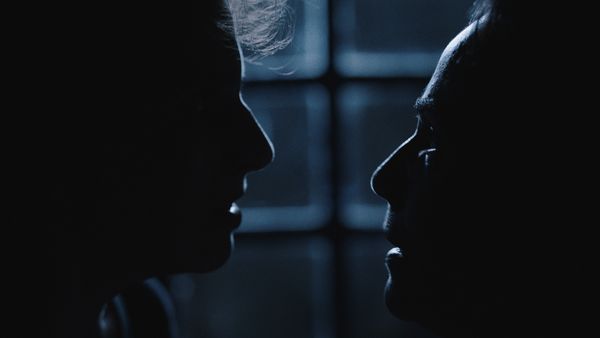Let’s talk a bit about the film origins. It’s based on your own mum but, clearly, it's not fully autobiographical on account of the fact that it's a female-centric movie rather than Malu having any sons. Did it help you to have that one step of remove from the character?
Pedro Freire: It did. So what happened is that I wanted to do this film about my mother and her relationship with the older generation and the younger generation. I had that clear but I wasn't clear with what characters would be around her. The very first thing that I wrote before finishing the very first page, I realiaed that that was going wrong, because I was writing the characters, Isadora, my sister, and Pedro. So I was in the film, the very first thing, and then I realised that it wasn't working. Because if I said that Pedro was being mean to his mother, it feels like the director is trying to say that he was, redeemed and when I said Pedro was taking care of his mother, it sounded like Pedro was trying to say that he was a good son. I wasn't interested in that at all. And that's one part of it.
So I decided to just put Isadora, but the things that happened to me and my mother were really important to me. So I decided to put things that happened with Isadora in the film and things that happened to me in the film. So I had a kind of mix of Pedro and Isadora in the same character, which is Joana. The other thing and maybe this is the most interesting thing, is that I grew up in this house where there was this character Malu Rocha, the mother, she was always the leading character of the family. There wasn't a breakfast, a dinner, or playtime, where she wasn't the eading character, we were always watching her.
How did your sister feel about that?
PF: When I told her I was going to do the film? At the beginning, she was really amazed and happy. I think at the beginning, she didn't realise the consequences. When she actually read the script, she was crying a lot because she really liked the script and she was sad that I was able to convey on the paper everything that happened and the way it was to be with her. The feeling of living with her was there in the script. And she helped me with the script. She brought me memories. She usually sent me WhatsApp audios at three o'clock in the morning, “I was sleeping and I dreamed and then I remembered this day that mum didn't like the review. I got in for a play in the magazine. And she was really fucking cold. That bitch. She was so competitive. And at the same time, she was amazing. She was great. I love her so much. Okay, I'm going to sleep, bye.” I thought, “Okay, I'll write that scene now”. In one scene, she's really fucked up because the mother is so competitive and then the next scene she's telling a story, she's amazed by her mother. This is the kind of relationship that we had. And my sister was moved to watch the film, she was crying a lot.
I can imagine, especially because of it being a female character it will feel close whereas somehow in a way that for you, it would feel a little bit more removed.
PF: I cried a lot writing the film - a lot. I had to work in a cafe, I don't have a good space in my home to write. So I went, I went to a cafe every day for almost one year to write it. People around me we're like, “What's happening?” I was sobbing sometime. Then in the film, when we were shooting, we had three weeks of rehearsal and three weeks of shooting. When we were rehearsing or shooting, many times I was crying. And the actresses were looking at me like, “Wow, he's really moved by that. He's really emotional.” And they told me that this was really strong for them - that because they felt that for the director, it became moving to them too.
The grandmother character is also crucial was she based on a real person too?
PF: Yes, totally based.Most things that happen in the film really happened to real people. The four characters are based on real people. And 80% of the facts that are shown in the film really happened in real life.
How did you cast the film? It’s a wonderful ensemble but I wonder how difficult it is because you have three generations and you’re tying to get people who can work across that kind of boundary.
 |
| Pedro Freire: 'My biggest effort was trying to put on the paper and then on the screen, the beautiful side of Malu.' Photo: Courtesy of Sundance Institute |
We had three weeks of rehearsals. I did three weeks of improvisation, never memorising the texts. And then the lines were memorised just before the shooting.a
That sounds Mike Leigh-ish
PF: Exactly. Mike Lee, Cassavetes, this is where I stole this idea - I stole from them. So on the set they memorised lines, we were doing exactly what's in the script, but the script is improved from the improvisations. You know, I shot improvisations with my cell phone every day, and at night, I would rework the script using the beautiful things that they brought.
Just to give one small example, when Lily says that she has won a contest on making faces and she does a really silly face - that's improvisation, the improvisation in rehearsal, so I brought that to the script. These are the really, really good spices that you put in the script.
They’re all wonderful actors but, In the beginning, the first week of rehearsals was a mess. I really hated it. I was crying when I arrived home and my wife, said, “What the fuck is happening?” I said, “Sorry, but this is all wrong. The cast is wrong. It's not going to work. It's really awful”. Because Lily was kind of doing the evil old lady, Malu was so depressed living in this house with these ceilings, like really messed up. And Joana was flat. She didn't have any emotions. She was trying to be natural. It was a mess. It was really, really fucking awful.
After one week of rehearsal, I sat with them and said, “People, let's be honest, this is not working. Let's try again.” So we came back to scene one. “Let's think. Malou is not depressed. She's a force of nature. She's a meteor. So up! No, Lily is not evil, she's really sweet, she's just trying to save her daughter. She's trying to do her best. And Joana, [he clicks his fingers], Come on, wake up, I know you're, you're the daughter of this amazing meteor, so you have some meteor in yourself. Be amazed by your mother, your eyes must shine with your mother.” They said, “Okay, I can do that.” And then everything worked. And the two last weeks of rehearsal were amazing. They were maybe the most powerful moment that I had in my professional artistic life, I was really happy. And then the shooting was kind of, now let's print it. We shot really, really little material. Little I have shot short films with more material than this feature film, because the actors were so prepared. Almost the entire film is one take, two takes at the most.
It’s quite a confined film with a lot of the action is taking place inside so did it help you had theatre actors, who are used to working in smaller spaces, for that?
PF: The fact that they come from theatre has a lot of benefits for the film. They understand the characters better. They like rehearsal very much and they are used to working with improvisation. For example, actors who come from TV, usually are not used to improvisation. But I think you're right, the fact that they are used to everything inside a confined space is a thing that helps them to understand the logic of the script.
The space is really important, too. How it was to find somewhere like that because it’s a distinctive building.
PF: Yes. That's the amazing work of production design by Elsa Romero. It's a miracle what she did with what little money she had. We needed this house that was very precarious, without a roof. At the same time, we needed a little room for Lily outside. So it's impossible to find this location as it was in the film. It's impossible because no one has studio rooms outside like that. But Malu did. I remember the house where I lived with her in the favela. We found, with the production designer, a house that was being built. So it was really new but still not painted. Then we painted over the new fresh cement all the old stains of water infiltrations. And then we built outside the little shacks for Tibira and Lily.
The Tibira character is really interesting and we should touch on that. Tibira is almost like a bit of a go-between and part of the family but very much an outsider in Lily’s eyes.
PF: I really wanted to have someone who is a partner to Malu. Malu is fighting her daughter, she’s fighting her mother, but there's someone with whom she's not going to fight. There's someone who really loves her whom she really loves, and with whom she never fights and with whom she can show just her sweet side, her caring side. I really needed that because I needed Malu to be not only this aggressive force of nature, but also someone who can, who can be really sweet to a friend.
What do you think your mum would think of you making a film about her?
PF: I’m not sure. Many times I thought that maybe she would be mad at me because I was portraying her as too violent or too mad. But I was afraid writing the film that I was portraying my mother just with her bad side, her violent, aggressive side. So I really made an effort because my memories could be really dark. My biggest effort was trying to put on the paper and then on the screen, the beautiful side of Malu. The poetry side of her, the caring side of her, the brilliant, the brilliant storyteller, the brilliant actress that she was.
How long did you work on the script?
PF: I spent a lot of time developing itSeven years have passed since the very first synopsis. But it was weird, because I finished the very first draft of it the month that Bolsonaro won the presidency. And Bolsonaro represents the military, the far right in Brazil and the far right military in Brazil represents the dictatorship in Brazil, and Malu, was traumatised by the dictatorshiop. So when when we started shooting, we were just entering the Bolsonaro government, and everyone on the crew and the cast said, “Well now we really must do this film. It's really important to do this film now because she was run over by exactly these kinds of people.” So at the end, when she says, “The battle is not over yet. We can't let these assholes stop being ashamed of being assholes.” She's talking about the dictatorship and the Seventies but she's also talking about Bolsonaro, about Donald Trump, about Boris Johnson. She's talking about Javier Milei in Argentina now, she's talking about the comeback of the far right. So when she says, “Where are we going?” This is also a question that I ask everyone. Where are we as a collective going? The world is going to end because of the fucking pollution? Are you for real? We are not stopping this?
I'm not sure if you saw that at the end I say, “To Pilar”, my daughter. Sometimes I think that maybe it's putting too much pressure on my kid, because I'm saying that you should do the revolution, not me. She’s four! In 16 years, she’s going to say, “Son of a bitch, you put me under all that pressure when I was only four years old!”
This is a very personal film, which has obviously been a very personal journey for your whole family, so what’s next for you after this?
PF: My second feature I'm writing now is about pregnant woman, and I'm strongly basing my experience on watching my wife pregnant with our kids, I'm really using all the things that happened in the pregnacy. It’s always so personal.
























